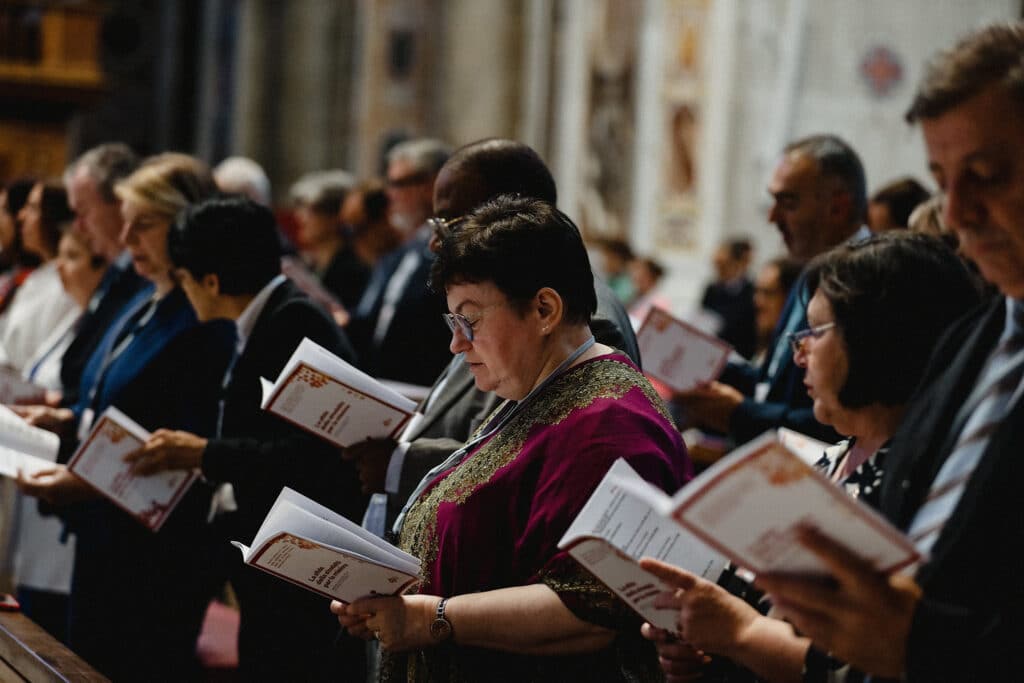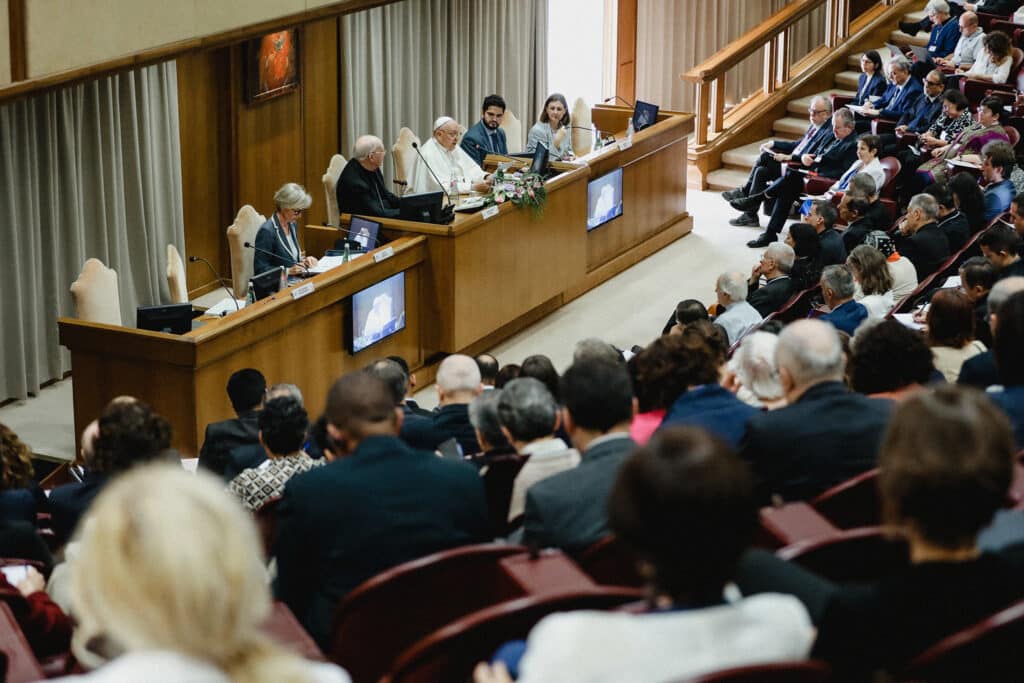“The challenge of synodality for the mission!”. This was the topic at the meeting of moderators of Associations of the faithful, ecclesial Movements and new Communities, organized by the Dicastery for the Laity, the Family and Life. Among the institutions approved by this Dicastery, 97 were represented through their moderator/main coordinator and an additional representative of their general directorate.
From the Schoenstatt Movement, two members of the Women’s Apostolic Federation, a Community approved by the Dicastery for the Laity, Family and Life, were present: the theologian Geni Maria Hoss (general leader of the community) and Celia Etchegaray (advisor to the General Directorate).
The meeting took place in the New Hall of the Synod, near St. Peter’s Square, on June 13, 2024. After registration, the participants proceeded directly to the central altar of St. Peter’s Basilica for Mass, presided over by Card. Kevin Farrel, Prefect of the Dicastery.
Spiritual Conversion
Following Mass, the day’s program began with an audience with Pope Francis. In his address, the Pope drew attention to the path the Church must follow as a synodal Church. According to him, synodality requires a spiritual conversion, because without an inner transformation it will not endure. The protagonist of the synodal Church is the Holy Spirit. Only in openness to the Spirit does the synodal dimension become a reality. The goal is that synodality becomes the natural and permanent practice of the Church; its way of being.
The Pope mentioned St. Paul VI, mentor of a synodal Church, when he created the Synod of Bishops shortly after the Second Vatican Council. Among the “synodal virtues,” Pope Francis noted: The first great interior transformation is to think as God thinks. “In the Church, before making any decision, before beginning any program, any apostolate, any mission, we must always ask ourselves: what does God want of me, what does God want of us, at this moment, in this situation? What I have in mind, what we have in mind as a group, is it really ‘God’s idea’?”. We must tune in to God. Synodality also demands attentive listening to others, because the Spirit acts where He wants. For this to be possible, we must foster the virtue of humility. Movements should not create closed enclaves, but be open to dialogue with others. Finally, the Pope extended his good wishes for a good meeting and asked for prayers, stressing: “Pray for me, not against me”. He concluded his audience with the Hail Mary prayer and a blessing.

Walking with the Church – as Church
The program continued with the welcoming remarks by the Prefect of the Dicastery, Cardinal Farrel. According to him, the topic was chosen to underline the importance of Associations of the faithful, Movements and new Communities marching in harmony with the whole Church. The Cardinal hoped that, consistent with the Pope’s thinking, there would be men and women in the Church who habitually practice the art of engaging in dialogue, of listening to one another, of seeking solutions to problems together.
Synodality in the footsteps of Vatican Council II
The Venezuelan lay theologian Dr. Rafael Luciani presented synodality as a fruit of the Second Vatican Council. He spoke on the following subject: “Towards a constitutively synodal and missionary Church”. The Second Vatican Council presents the ecclesiology of the People of God and, in this way, recognizes the fundamental equality of all the faithful based on their baptismal dignity. The synodal and missionary way of being is inherent to the Church. The practice of co-responsibility of every Christian is not merely an auxiliary service, but rather an essential one in the Church. The synodal Church in mission is born from the synergy of ministries, gifts and charisms. Luciani affirmed in his lecture that the synodal Church is perhaps the best response and prophetic sign of communion and diversity in a society of exclusion, inequity, polarization and deinstitutionalization. For this, it is necessary to consult, listen, engage in dialogue, discern in community, ask for advice, make decisions and be accountable.
Experiences of synodality in Associations of the faithful, Movements and new Communities
“The Experience of Synodality in Movements” was the topic addressed by Dr. Elisa Lisiero (Dicastery for the Laity, Family and Life). Movements and Associations, particularly those recognized by the Dicastery, carry synodal elements in their communitarian and relational mode and have a common goal, that is, a singular mission. The synthesis of the first stage of the Synod (2022) demonstrated the potential of synodality translated into concrete structures and practices, tested over the years. These are multifaceted and valuable experiences at the service of the Church’s mission. However, this does not mean that they do not have challenges to overcome and need for further development along the way.
Of particular importance are the structures of fraternal coexistence in groups and small Communities, which are the basis of the associative structure of the Movements. They reflect the spirit of friendship and family that springs from the charism or evangelical ideal. This familial and communitarian dimension of the Movements contrasts with the individualism and loneliness that dominate today’s society.
The form of governance, which includes practices of co-responsibility, gives rise to a new ideal of shared leadership. Through practices of solidarity, the Movements focus on the dignity of the person and allow the Gospel lived in its essence to reach many of the peripheries of society.

The meeting was intense in terms of the topics presented, but also very valuable insofar as it allowed for numerous encounters and exchanges.
The highlight was undoubtedly the encounter with the Pope. At the end of the first break after the audience with the Pope, seated in a wheelchair, he waited for each participant to greet him in the hallway. Surprise and joy could be seen on the faces of the participants, even though it was only for a few seconds…. Too short for the participants, but undoubtedly too long for a Pope in very poor health. Let us pray that the Holy Spirit will enlighten him and pour out a bountiful stream of his gifts for the whole Church.
Translation: Maribel Acaron
